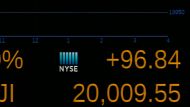The government is being urged to revisit bilateral trade deals with Australia's big Asian trade partners, after Donald Trump pulled the plug on the Trans-Pacific Partnership.
Mr Trump's decision to pull the United States out of the TPP this week would likely to deprive Australian exporters of deeper access to key overseas markets, businesses said on Tuesday.
More World News Videos
President Trump signs three executive orders
President Donald Trump has signed memorandums to pull the US out of the proposed TPP, freezing most federal government hiring and reinstating a ban on providing federal money to international groups that perform abortions.
The TPP, one of the world's biggest and most controversial trade deals, was forecast to benefit a range of Australian export industries including agriculture, financial services and manufacturing. But without its largest member, the deal is in disarray.
As the government looks to salvage some sort of regional agreement by including China, which was excluded from the TPP, business leaders say Mr Trump's "America First" stance should prompt Australia to look at other trade options.

This should include strengthening the free trade deals it has signed with Japan, Korea and China, the country's three biggest trading partners.
Donald McGauchie, chairman of beef producer AACo, said the TPP would have been of "great benefit," but Australia now needed to go "back to the drawing board." That might include a new agreement including China, or strengthening existing bilateral deals.
"If the United States is going to lock itself away from the rest of the world to some extent, then there may be an appetite amongst a number of other countries to look at strengthening the arrangements between them, separately from the US," said Mr McGauchie, also a director of Graincorp and Nufarm
"There would have been significant benefits in the TPP in driving further reform in countries like Japan and Korea and others that would have come out of this, had it proceeded.

"It may now be a better deal for us to go back and look at how we can improve those bilateral deals with Korea, Japan, and other countries."
More than a third of Australia's $40 billion in farming exports go to TPP nations. It had been hoped that farmers would gain greater access to nations including Korea, Mexico and the United States through the TPP.
National Farmers Federation chief Tony Mahar said the sugar industry was projected to have sold an extra 80,000 tonnes a year to the US under the TPP, and the long-term benefits of deeper trade links across these markets would have been significant.
"All of agriculture would have benefited if the TPP had been ratified," Mr Mahar said. "It's one less opportunity for them to export food and fibre."
Australian Industry Group chief executive Innes Willox said the US pulling out of the TPP was an opportunity for Australia to reassert its own interests in trade policy.
Mr Willox, who represents manufacturers, said Australia should not shy away from international trade and investment. However, a lesson from recent events overseas was that industrial "transitions" needed to be managed carefully, and benefits of global engagement "more widely dispersed".
"A part of this recommitment to international trade and investment should be the assessment of whether a TPP-minus-one approach should be pursued or whether greater emphasis should be placed on extracting the maximum benefits from the range of other free trade arrangements that we have in place across the region," he said.
Financial services is another sector that may have benefited from the TPP.
The deal may have allowed firms to more easily target customers overseas, including in investment advice and funds management, where Australia has expertise thanks to the $2.1 trillion superannuation system.
The chief executive of the Financial Services Council, Sally Loane, said Mr Trump's move to dump the TPP was "disappointing" but there were still 11 signatory countries.
"We look forward to further opportunities to build upon Australia's existing network of free trade agreements with our Asian neighbours and strengthening ties with our trading partners in the Pacific rim," she said.
Aside from the TPP, the Trump presidency is prompting some Australian business with US operations to look at how they may be affected by mooted tax changes to encourage more businesses to invest in the US.
Global general counsel at Resmed, David Pendarvis, on Tuesday said that if there were incentives to manufacture more in the US, "that could be an opportunity for us," though it would depend on the details of any such policies.
with Brian Robins















